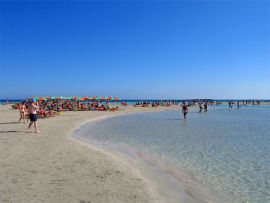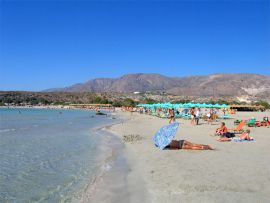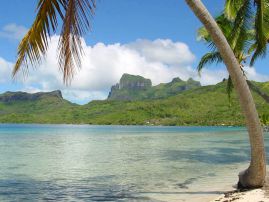1) The White Mountains
The White Mountains or Lefka Ori are located in the centre of West Crete, about 40 km south of the town of Chania. They are called White Mountains because they are covered in snow until late in the spring and during the summer the sun is reflected on the limestone summits and makes them appear white as well. The highest summit is Pachnes (2453m). They are regarded as having the best walks of all mountains in the island.
The White Mountains are well known due to the Samaria Gorge, which is the longest gorge in Europe of about 18 km length, and it was created by a small river running between the White Mountains (Lefká Óri) and Mt. Volakias.
2) Elafonisi
Elafonisi is an extremely small island located south-west of Chania. It is a tiny islet connected with the land through a lagoon of turquoise water.It is very easily accessible on foot, because only a shallow canal, at about 800 meters long, divines Elafonisi from the nearest Cretan coast. It is a peaceful place full of colours, light and white sand. The place reminds of exotic paradise, because of the golden sand and the almost white waters. Elafonisi is one of the most popular destinations in Crete.
3) Falassarna
It is regarded as one of the nicest beaches in Crete and it is located 16 km west of Kastelli. It is a long, big, sandy, natural beach with amazing views during the sunset. It gives the impression that it is not really organised even though there is a beach bar at the start and umbrellas and loungers at different locations.
4) Balos lagoon
North of Falasarna is the wild and remote Gramvoussa peninsula. The peninsula is formed by steep rocks and is covered with thyme and origanum bushes and wild flowers.
On the north-west side of the peninsula, opposite to the island of Gramvoussa, is the wonderful lagoon of Balos. It is covered with fine white sand, and the sea has an emerald colour.
The road to the beach stops about 2 km before it and the visitor has to follow a pave road with nice views to reach the beach. If not by car and foot, you can get an early morning ferry from the port of Kissamos for a daily excursion to Balos lagoon and Gramvousa island.
5) Lake Kournas
It is the only natural lake in the island. The landscape is fine and the vegetation dense. There is a mix of bushes, reeds and brambles around it and some olive trees on its south side. A cafe and taverna can offer you some rest and food.
6) Imbros Gorge
It is a very picturesque gorge, six kilometers long, which can be walked in four hours. It extends between the villages of Komitades and Imbros, cutting through the western fringes of the White Mountains.
7) Kourtaliotiko Gorge
The Gorge begins in the village of Koxare and follows the Kourtaliotiko River, as does the road. The Gorge is named by the noises (rattle) caused by the strong north wind. It is narrow and the landscape is very beautiful; the river that flows through it forms five big pools and then a waterfall. At the end of the Gorge there is an enchanting beach with crystal clear water from which cliffs with palm trees rise to the right and the left. Near the Palm Beach a path leads to the magnificent Monastery of Preveli.
8) Lake Votamos (Zaros)
It is a picturesque lake surrounded by barren, flinty slopes. There are tavernas near the shore which serve trout from the lake.
9) Lasithi
Lasithi is located in the east Crete and it is regarded as the 'Plain of Windmills' even though very few of the thousands of white-sailed windmills still work. The contrast of fertile fields, gardens and orchards with the treeless grey slopes surrounding it is very impressive.
10) Aspros River
Aspros River forms a very nice valley which opens into the sea at the east end of Makrygialos beach (south-east Crete).
11) Vai
Vai is located on the north-east Crete. There is the only natural palm-tree forest in Europe which is already designated as an 'Aesthetic Forest'. The palm trees (Phoenix theophrasti) may have been planted by Arabs or ancient Phoenicians. The forest is located at the eastern part of Crete, a few kilometres north of the Palaiokastro village. This particular palm is known as one of the two non epigenetic species of the palm family in Europe (the other one occurs in the Canary Islands).


















